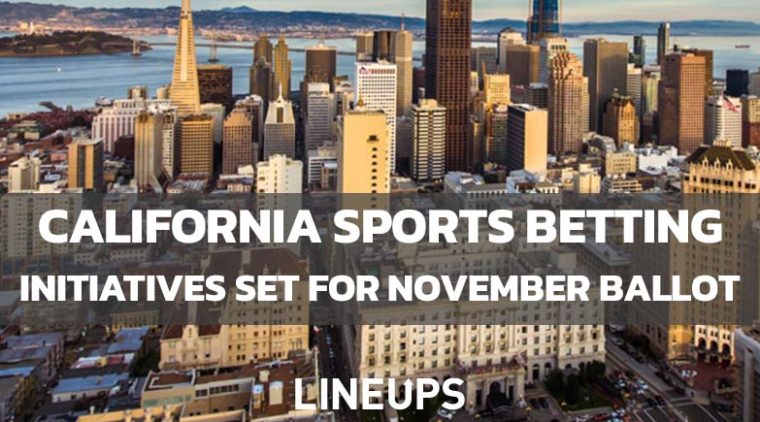California’s Online Sports Betting Initiative Approved for November Ballot

On Monday, the California Secretary of State’s office announced that it had verified a critical mass of the 1.6 million signatures necessary to back the California online sports betting measure. On Thursday, we will receive official confirmation from Secretary of State Dr. Shirley Weber that the ballot measure has qualified and will appear on the November ballot. We’re set for a fascinating battle for control over what will likely become the country’s most significant legal sports betting market sooner rather than later.
The online sports betting initiative in California, led by FanDuel and DraftKings, has reached the signature threshold required to be eligible for the November ballot. The measure faces stiff competition from Tribal Gaming entities, who want betting to take place in-person only.
— David Payne Purdum (@DavidPurdum) June 28, 2022
Online vs Retail Sports Betting
Two competing measures will appear on the ballot in November, backed by significant funding. National operators backing the online proposal have contributed $100 million to support their initiative’s passage. California tribes have committed at least as much to blocking that measure and supporting the retail measure.
On the ballot in November, California voters will see the following:
- Yes or no on tribal-backed, retail-only sports betting
- Yes or no on the online sports betting measure
Online Operators Vow to Help Fund Homelessness Problems
The initiative by online operators is known as the “California Solutions to Homeless and Mental Health Solutions Act,” and the measure earmarks most tax dollars for combating the state’s homeless problems. Seven national operators are backing this initiative, including the nation’s leading operators, FanDuel, DraftKings, and BetMGM.
The proposal would include an up-front $100 million licensing fee for each operator in the state, as well as an ongoing 10% tax on all revenue. 85% of tax revenues would go to homelessness and mental health, and the remaining 15% would go to tribes not directly involved in sports betting. According to an analysis from the California Director of Finance, online sports betting could increase state revenues by “potentially mid-hundreds of millions of dollars annually.”
“This initiative is a critical step forward,” said Tamera Kohler, CEO of the Regional Task Force on Homelessness for the San Diego area. “Dedicating revenue to the issue of homelessness is a win-win for our state. It would provide an ongoing funding source of hundreds of millions of dollars each year to fight homelessness and provide mental health services to those most in need.”
Another $5 million for the tribes-backed California sports betting initiative that's already qualified for the 2022 ballot, bringing the total to $45 million.
Tribal groups have also raised $35 million to oppose a FanDuel/Draft Kings-backed mobile sports betting initiative. https://t.co/UNM32SVqtP
— Rob Pyers (@rpyers) May 26, 2022
Coalition for Safe, Responsible Gaming Makes Statement
Following the California Secretary of State’s announcement, a coalition of California Indian tribes reiterated strong opposition to the online betting measure and vowed to defeat it. The coalition has pushed polling results from April that, in a sample of 1,094 Californian voters, 53% oppose the initiative, 36% favor it, and 10% are undecided.
The proposition would turn “virtually every cell phone, laptop, tablet, and gaming console into a gambling device, increasing the risks of underage and problem gambling,” said Tribal Chairman Cody Martinez, Sycuan Band of the Kumeyaay Nation. “We will run a vigorous campaign against this measure and are confident the voters will see through the deceptive promises being made by these out-of-state gambling corporations.”
Concerns have also been raised about online sports betting initiatives hurting the tribes have also been raised. “This November ballot has the potential to greatly impact the progress California tribes have made toward self-sufficiency in the last two decades,” said Vice-Chairwoman Beth Glasco, Barona Band of Mission Indians. “Time and again, California voters have stood with Indian tribes to support gaming on tribal lands while rejecting initiatives that would hurt tribes.”
Don't be fooled! Out-of-state gambling corporations want California voters to believe that if we legalize online sports gambling, the homelessness crisis will be solved. But their deceptive ballot measure would only make things worse. pic.twitter.com/vLmm29jBar
— Stop the Corporate Online Gambling Prop (@NoCorpGambling) June 24, 2022
What Happens if Both Measures Pass?
California will be the only state in the nation with initiatives to legalize sports betting on its 2022 ballot, but it’s not the only one to have legalized via ballot. Voters in previous state elections have legalized sports betting in Arkansas (2018), Colorado (2019), Louisiana (2020), Maryland (2020), and Virginia (2020), all of which have gone on to launch legal online and retail sports betting.
If both initiatives on the ballot in November pass, sports betting will likely end up in court, where a judge would decide whether or not they are competing measures. If they are deemed to be competing, the one with the most affirmative votes would be passed. Tribes can argue they are competing measures, but there are conflicting opinions on the likelihood that even one of the two initiatives will pass. Nonetheless, the next several months will illuminate the future of sports betting in California, and we’ll have you covered with the latest news.